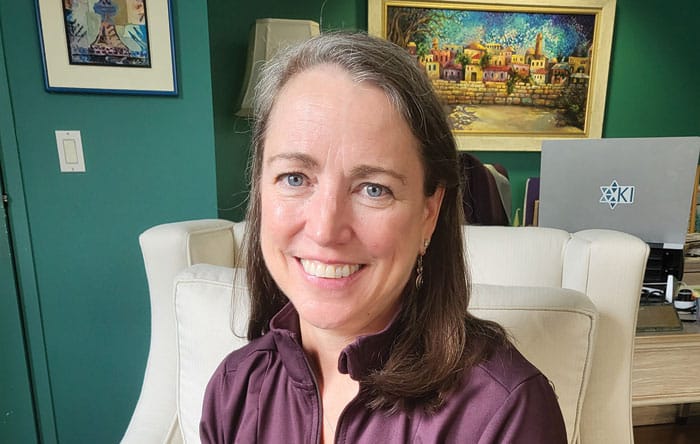 Rabbi Amy Bernstein
Rabbi Amy Bernstein Rabbi Amy Bernstein’s 28-year career has been evenly divided – 14 years as senior rabbi at Temple Israel, Duluth, Minnesota and 14 years at Kehillat Israel (KI) in Pacific Palisades, the largest Reconstructionist synagogue in the country.
She still sounds surprised at the way her life has turned out.
Growing up the daughter of a single mother in Atlanta, Bernstein felt most at home at her Jewish day school. “My safety was in going to school, being with teachers I adored and respected. For me to feel safe meant being part of the Jewish culture, Jewish worldview, Jewish assumptions about what we are here for.”
That safety was shaken up when, at 16, she came out as a lesbian. “The message was clear that a gay or lesbian relationship was completely outside the realm of holiness,” she wrote. “It was also clear that anyone living in a gay or lesbian relationship stood outside of the tradition, and any ‘family’ created out of such a bond could only be a mockery of a Jewish family.”
She felt estranged from her Judaism. And that self-imposed separation was painful. “My safety,” Bernstein explained, “always came from the wisdom of the Jewish tradition, the priorities of Jewish values lining up with how people lived their lives. The heartbreak for me was when those two were separated, when I had to leave yeshiva because it was not going to matter.”
But Bernstein was also taught that what you do, what you say, what you are in the world matter. Your neshama is what matters. When she came out as lesbian “all of that was being betrayed. They were saying ‘no, that isn’t what matters most.’ Did you lie to me or leave a big part out? I wrestled a long time with that question. I was heartbroken.
“If my neshama is what matters, if how I act in the world is what matters — I am kind, I am honest, loyal, I love this tradition. I am always seeking to learn. You won’t teach me, and I am so hungry to learn. Nothing else about the person matters.”
Even though ”being out in the world without a Jewish context was really hard,” it was a decade before she found her way back to her faith after attending a Reconstructionist service at a gay and lesbian synagogue in Atlanta.
“In the theater world you age out very quickly. Playing the ingénue, you are done at 27. I really wanted something I was going to be better at as I got older.”
A graduate of Northwestern University, where she studied English Literature and Cultural Anthropology, Bernstein still had no idea what she wanted to do with her life. She had danced professionally, but didn’t want to be in a profession where careers were short. “In the theater world you age out very quickly. Playing the ingénue, you are done at 27. I really wanted something I was going to be better at as I got older.” She was working at a job in women’s healthcare when a rabbi recommended she pursue the rabbinate.
But when a chance to apply for the senior rabbi position at Duluth’s Temple Israel, she wasn’t sure it made sense. “I was amazed [Temple Israel] hired me,” she told the Journal. “I didn’t think a congregation in Duluth, or anywhere, would be ready for a female senior rabbi, or maybe at all. But certainly not an out lesbian.“
She was more confident when she auditioned for the senior rabbi position at KI.
“The deal was sealed when I taught Torah for my audition out here,” she said. “I came out from behind the bimah, holding the Tanakh in my hand, and just started. I picked the raciest part of the parsha, where Tamar seduces her father-in-law, rather than doing the safe part. I asked them to join me in getting the real gorgeousness out of this story, clothing, hiding, trickery and how it’s run through this family. They were so excited to have someone who was excited to learn with them.”
She still feels that excitement 14 years later. “They respond the way they did the first time – so beautifully to (my) enthusiasm about our tradition. They wanted somebody with intellect and warmth; I had to have chops, too.” Bernstein’s influence can be felt beyond Kehillat Israel. The rabbi’s podcasts, available on the Kehillat Israel website, have been downloaded over 250,000 times.
Closer to home, Bernstein remembers her mother’s reaction when she came out. “She handled the gay part fine — if it was somebody else,” Bernstein said. “Homosexuality was not the issue. It was that I was going to ruin her picture of walking down the aisle with her son-in-law. I looked like Susie Creamcheese — and she had a lot of assumptions about that. Eventually, though, she did come around.”
Fast Takes with Rabbi Amy Bernstein
Jewish Journal: What is your favorite Jewish food?
Rabbi Bernstein: Brisket.
JJ: If you could have a super power, what would it be?
Rabbi Bernstein: To talk to animals.
JJ: If you had not chosen the rabbinate, what would you be doing today?
Rabbi Bernstein: Working in the nonprofit world.























 More news and opinions than at a Shabbat dinner, right in your inbox.
More news and opinions than at a Shabbat dinner, right in your inbox.